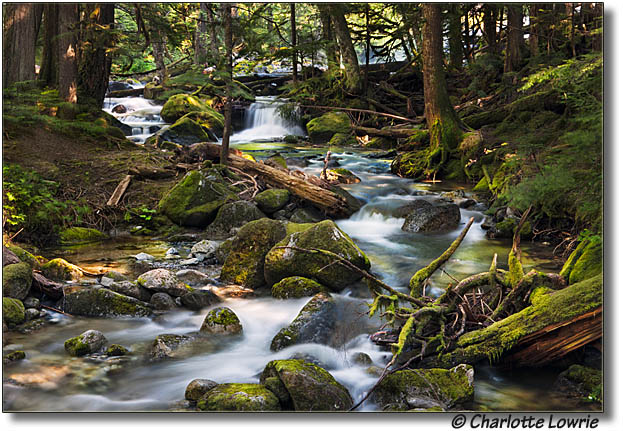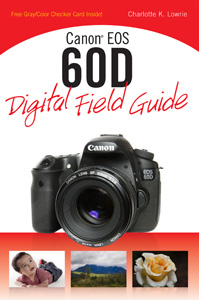By Charlotte Lowrie
One of the beauties of photography is that there is always the promise of making better pictures tomorrow than you made today. Like virtually all artistic endeavors, few, if any of the most celebrated photographers would say that they've reached the pinnacle of where they can take their imagery. There is always more to learn, more to photograph. Always more. But it seems inevitable that along the way, we get stuck. A picture that we considered a personal best last year bears a striking resemblance in form and substance to the image we made yesterday. We've
hit a plateau.
By definition, a plateau is a flat place. On the flat space of a
plateau, nothing much advances or recedes, rather it stays the same. While a plateau may be a high one, it's a flat all the same. In the natural world, many types of plateaus are bordered by mountains. And it's the surrounding
mountains that we
 want to begin climbing. The challenge is finding a sure way off the plateau and onto the next mountain.
want to begin climbing. The challenge is finding a sure way off the plateau and onto the next mountain.
I don't claim to have all the answers, but I can share with you ways in which I challenge myself to do better work.
These suggestions assume that you already know how to use your
camera and that you are experienced with photographic exposures. If
you aren't familiar with either, than learning your camera and the
fundamentals of exposure are your best first steps in moving to the
next level of photography.
- Be your own toughest critic. Until you can step back from your imagery and evaluate it with a cool, clear eye, you likely won't notice how you could have reinterpreted the scene or subject for a more creative image. For me to do this, I make images, process and edit them, and by the time I finish
editing them, I tend to 'love' them. I know this is my habit, so I
withhold final judgment for two or three days, and then review the
images with a dispassionate eye. With that visual separation period of time, I can better evaluate an image for its merits and demerits.
- Cultivate a group of honest critics. If you have photographer friends, especially professional
photographers, ask them to evaluate your best images. Choose people whose work and opinion you value. You're not looking for comments such as, "Great shots." Rather, you want to know how they respond to the images: What makes each image work, or what makes the image fall flat. I recommend against sending pictures with long text explanations detailing constraints you faced during shooting. If you have to qualify images ahead of time, then chances are good that these are not your best images. Instead, go back and reshoot when you don't have to work around constraints, and then send your best work for evaluation. Otherwise, you're wasting your friends' time, and they will be less inclined to continue ongoing evaluations. You should also be willing to reciprocate by sharing your honest thoughts on their images.
Nowadays, it's easy to default to online photo forums and social media Web sites for evaluations of your images. From my experience, online critiques from strangers are a mixed bag. Evaluations range from off-handed and sometimes mean-spirited comments to formulaic responses that
provide you with little meaningful
information. In a recent experiment, someone posted a Henri Cartier-Bresson image on a online photo site. The "critics"
quickly and resoundingly criticized the image as being "soft, gray, and blurry." Some online sites
have members who are far more concerned about showing off their technical prowess than they are with
providing insightful comments on the image content. Did I mention that it's a mixed bag? ;)
A corollary to this point is that you need to grow a thick skin. Photography is subjective. Know that some will like your pictures while others will dislike your images. Get used to it. We all have different tastes.
- Follow the best and brightest. If you don't have a list of favorite photographers, now is the time to spend time creating a list of professional photographers whose images resonate with you. Follow their new work closely. Once in awhile, choose one of their pictures that you like best on their Web site. Then bring up one of your images on the
computer screen next to it and do a direct comparison. This is a great way to quickly identify ways to improve your shooting.
- Always have a personal project in the works.
There is nothing better than a personal project to bring your
photography to the next higher level. Define your project vision
clearly, and then be unrelenting in keeping only those images that
meet the vision. If you are like me, you'll throw away far more
images than you keep, but the keepers will be the crème of the crop.
And along the way, you'll have refined your vision and your work,
and you'll have a new body of work for your portfolio.
- Read. Read. Read. There are so many wonderful books on photography that it's just impossible to not learn and be inspired by reading about photography. I write books, but I'm
first and always been a dedicated reader/learner. No one author has all the answers, but many authors have valuable insights that can benefit your work. If you are on a budget, then go to a book store and look at the book before you buy it. Sometimes
the book content simply doesn't live up to the promise of a
compelling title. And at $25 to $30 a book, it pays to browse through the book first. I'm rediscovering the fine writing and photography of John Shaw in his classic book, Nature Photography Field Guide.
In the book, Shaw references film, but I can easily apply it to today's digital photography, and the principles he teaches are timeless.
Remember that photography is comprised of both creative and
technical skills. Personally, I divide my reading between the two. I read one book on the creative aspects of photography one month, and then I will read a book on
advanced exposure or Photoshop the next month.
-
Attend a great workshop
or class. Ask others for their recommendations on the best workshops to attend.
BetterPhoto offers a variety of great courses.
-
With every image, ask yourself, "Is this the best that I
can do?" Don't wait for someone else to push you to do better
work. Push yourself with every image you make.
- Find your vision and voice. This is the quintessential piece of advice. Finding your
 vision and voice takes time and lots of shooting for some photographers. Other photographers are born with a vision and a strong voice. If you're still trying to figure out what it means to have "vision," then a good first step is to always verbalize why you are making each and every picture. As you clarify your objectives with each picture, and as you critically evaluate your images, you will begin to sense a broader context for your work. And
as you see the overarching context of your vision, you'll begin to
build a body of work that "hangs together" with your unique imprint on the images.
vision and voice takes time and lots of shooting for some photographers. Other photographers are born with a vision and a strong voice. If you're still trying to figure out what it means to have "vision," then a good first step is to always verbalize why you are making each and every picture. As you clarify your objectives with each picture, and as you critically evaluate your images, you will begin to sense a broader context for your work. And
as you see the overarching context of your vision, you'll begin to
build a body of work that "hangs together" with your unique imprint on the images.
I hope that these suggestions are helpful. If you have other ideas or questions, feel free to e-mail me at charlotte@ wordsandphotos.org.
Related articles:

